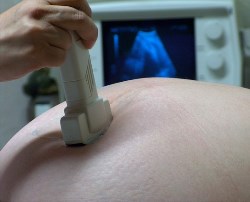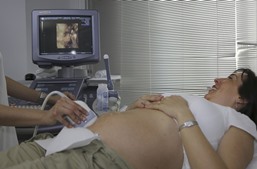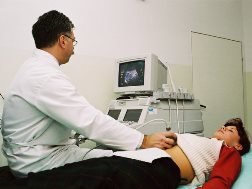How to Enroll in the Right Sonogram Technician Training Program near Rifle Colorado
 Since you have decided to pursue an ultrasound technician degree near Rifle CO, the next step is to start the procedure of selecting a school. First, you have to find the ideal program that will provide the appropriate training to become a qualified professional. And given that a number of states do mandate that ultrasound techs be either certified or licensed, depending on where you will practice you may also need preparation to pass a certification or licensing examination. So it’s very important that you investigate each college in order to evaluate and compare your choices. But just where does one start? Many potential students will start by looking for colleges that are within commuting distance of their residences and then by comparing tuition. Naturally cost and location need to be considered when arriving at a decision, but there are other important factors also. Such as, if the ultrasound technician schools are accredited or if they sponsor internships. These and additional qualifiers will be addressed more in depth later in this post. But to start with, let’s go over what a sonogram tech does and the degrees and online education options that are available.
Since you have decided to pursue an ultrasound technician degree near Rifle CO, the next step is to start the procedure of selecting a school. First, you have to find the ideal program that will provide the appropriate training to become a qualified professional. And given that a number of states do mandate that ultrasound techs be either certified or licensed, depending on where you will practice you may also need preparation to pass a certification or licensing examination. So it’s very important that you investigate each college in order to evaluate and compare your choices. But just where does one start? Many potential students will start by looking for colleges that are within commuting distance of their residences and then by comparing tuition. Naturally cost and location need to be considered when arriving at a decision, but there are other important factors also. Such as, if the ultrasound technician schools are accredited or if they sponsor internships. These and additional qualifiers will be addressed more in depth later in this post. But to start with, let’s go over what a sonogram tech does and the degrees and online education options that are available.
Click Here to Get Free Information on Ultrasound Technician Schools!
Ultrasound Tech Work Summary
 There are multiple professional titles for ultrasound techs (technicians). They are also referred to as ultrasound technologists, sonogram techs, and diagnostic medical sonographers (or just sonographers). Regardless of name, they all have the same primary job function, which is to implement diagnostic ultrasound techniques on patients. Even though many work as generalists there are specialties within the field, for instance in cardiology and pediatrics. Most practice in Rifle CO clinics, hospitals, private practices or outpatient diagnostic imaging centers. Common daily job duties of an ultrasound technician can consist of:
There are multiple professional titles for ultrasound techs (technicians). They are also referred to as ultrasound technologists, sonogram techs, and diagnostic medical sonographers (or just sonographers). Regardless of name, they all have the same primary job function, which is to implement diagnostic ultrasound techniques on patients. Even though many work as generalists there are specialties within the field, for instance in cardiology and pediatrics. Most practice in Rifle CO clinics, hospitals, private practices or outpatient diagnostic imaging centers. Common daily job duties of an ultrasound technician can consist of:
- Keeping records of patient medical histories and specifics of each procedure
- Counseling patients by explaining the procedures and answering questions
- Readying the ultrasound machines for testing and then sterilizing and re-calibrating them
- Escorting patients to treatment rooms and making them comfortable
- Operating equipment while minimizing patient exposure to sound waves
- Evaluating results and identifying necessity for additional testing
Ultrasound techs must frequently assess the safety and performance of their equipment. They also are held to a high ethical standard and code of conduct as health practitioners. So as to maintain that degree of professionalism and remain up to date with medical knowledge, they are required to enroll in continuing education programs on an ongoing basis.
Sonogram Technician Degrees Offered
 Sonogram technician enrollees have the opportunity to earn either an Associate or a Bachelor’s Degree. An Associate Degree will generally take about 18 months to 2 years to complete dependent on the program and class load. A Bachelor’s Degree will take longer at up to 4 years to finalize. Another alternative for those who have already obtained a college degree is a post graduate certificate program. If you have received a Bachelor’s Degree in any major or an Associate Degree in a relevant medical field, you can enroll in a certificate program that will take only 12 to 18 months to complete. One thing to keep in mind is that most sonographer programs do have a practical training component as part of their course of study. It often may be fulfilled by taking part in an internship program which many schools sponsor through Rifle CO hospitals and clinics. Once you have graduated from one of the degree or certificate programs, you will then need to fulfill the licensing or certification prerequisites in Colorado or whatever state you decide to practice in.
Sonogram technician enrollees have the opportunity to earn either an Associate or a Bachelor’s Degree. An Associate Degree will generally take about 18 months to 2 years to complete dependent on the program and class load. A Bachelor’s Degree will take longer at up to 4 years to finalize. Another alternative for those who have already obtained a college degree is a post graduate certificate program. If you have received a Bachelor’s Degree in any major or an Associate Degree in a relevant medical field, you can enroll in a certificate program that will take only 12 to 18 months to complete. One thing to keep in mind is that most sonographer programs do have a practical training component as part of their course of study. It often may be fulfilled by taking part in an internship program which many schools sponsor through Rifle CO hospitals and clinics. Once you have graduated from one of the degree or certificate programs, you will then need to fulfill the licensing or certification prerequisites in Colorado or whatever state you decide to practice in.
Online Ultrasound Technician Colleges
 As previously mentioned, nearly all ultrasound tech schools have a practical requirement to their programs. So while you can earn a certificate or degree online, a substantial portion of the training will be either conducted in an on campus laboratory or at an approved off campus medical care provider. Clinical training can usually be satisfied by means of an internship at a local Rifle CO hospital, outpatient clinic or family practice. But the rest of the training and classes can be attended online in your Rifle home. This is particularly convenient for those individuals that keep working while earning their degrees. In addition online programs are often more affordable than on-campus alternatives. Expenditures for commuting and study materials may be lessened as well. But just as with every sonography school you are considering, make sure that the online school you ultimately pick is accredited. Among the most highly respected accrediting agencies is the Commission on Accreditation of Allied Health Education Programs (CAAHEP). Accreditation is especially significant for certification, licensing and finding employment (more on accreditation later). So if you are dedicated enough to attend classes away from the classroom in the comfort of your own home, then an online degree may be the right option for you.
As previously mentioned, nearly all ultrasound tech schools have a practical requirement to their programs. So while you can earn a certificate or degree online, a substantial portion of the training will be either conducted in an on campus laboratory or at an approved off campus medical care provider. Clinical training can usually be satisfied by means of an internship at a local Rifle CO hospital, outpatient clinic or family practice. But the rest of the training and classes can be attended online in your Rifle home. This is particularly convenient for those individuals that keep working while earning their degrees. In addition online programs are often more affordable than on-campus alternatives. Expenditures for commuting and study materials may be lessened as well. But just as with every sonography school you are considering, make sure that the online school you ultimately pick is accredited. Among the most highly respected accrediting agencies is the Commission on Accreditation of Allied Health Education Programs (CAAHEP). Accreditation is especially significant for certification, licensing and finding employment (more on accreditation later). So if you are dedicated enough to attend classes away from the classroom in the comfort of your own home, then an online degree may be the right option for you.
Topics to Ask Sonography Colleges
 Now that you have decided on which degree or certificate that you would like to obtain, you can start the process of assessing and comparing ultrasound tech colleges. You may first want to choose whether you would rather access classes online or commute to a school campus in the Rifle CO area. Obviously location will be important if you select the latter, and the price of tuition undoubtedly will be an initial qualifier also. But there are other variables that you should also take into consideration, such as if the programs are accredited and if they provide internship programs. So in order to carry out your due diligence so that you can arrive at your ultimate selection, following are a few questions that you may want to ask each ultrasound tech program before deciding.
Now that you have decided on which degree or certificate that you would like to obtain, you can start the process of assessing and comparing ultrasound tech colleges. You may first want to choose whether you would rather access classes online or commute to a school campus in the Rifle CO area. Obviously location will be important if you select the latter, and the price of tuition undoubtedly will be an initial qualifier also. But there are other variables that you should also take into consideration, such as if the programs are accredited and if they provide internship programs. So in order to carry out your due diligence so that you can arrive at your ultimate selection, following are a few questions that you may want to ask each ultrasound tech program before deciding.
Are the Ultrasound Tech Colleges Accredited? The majority of ultrasound tech schools have acquired some form of accreditation, whether national or regional. Nevertheless, it’s still important to confirm that the program and school are accredited. One of the most highly regarded accrediting agencies in the field of sonography is the Joint Review Committee on Education in Diagnostic Medical Sonography (JRC-DMS). Programs obtaining accreditation from the JRC-DMS have undergone a detailed evaluation of their teachers and course materials. If the program is online it might also earn accreditation from the Distance Education and Training Council, which focuses on distance or online education. All accrediting agencies should be recognized by the U.S. Department of Education or the Council on Higher Education Accreditation. In addition to ensuring a quality education, accreditation will also assist in securing financial assistance and student loans, which are many times not accessible for non-accredited colleges. Accreditation may also be a pre-requisite for certification and licensing as required. And a number of Rifle CO health facilities will only hire graduates of an accredited college for entry-level positions.
Are Internship Programs Offered? Find out if the sonogram technician schools you are assessing have partnerships with Rifle CO clinics or hospitals for internship programs. Internships are not only an excellent means to receive practical training in a clinical setting, they are additionally a way to fulfill the practical training requirement for most programs. As an ancillary benefit, they can help students and graduates develop professional connections in the Rifle healthcare community and assist with obtaining employment.
Is Job Placement Assistance offered? You will most likely wish to secure employment quickly after graduating, but finding that first job in a new profession can be challenging without help. Ask if the ultrasound tech programs you are reviewing have job assistance programs and what their success rates are. Rapid and high placement rates are a good sign that the schools have substantial networks and good relationships with Colorado healthcare employers. It also confirms that their students are highly regarded and in demand.
Where is the College Located? For many students, the school they select will have to be within travelling distance of their Rifle CO home. Students who have decided to attend online classes naturally will not have to concern themselves with the location of the campus. However, the availability of area internships will be of importance. Something to keep in mind is that if you decide to enroll in a program that is out of state or even out of your local area, you might have to pay a higher tuition. State colleges often charge higher tuitions for out of state residents. And community colleges commonly charge a higher tuition for those students that don’t reside within their districts.
How Large are the Classes ? Unless you are the kind of person that prefers to sit way in the rear of the classroom or hide in the crowd, you will undoubtedly want a small class size. Smaller classes permit more individual participation and personalized instruction. Ask the schools you are reviewing what the typical student to teacher ratio is for their classrooms. If practical you may want to monitor one or more classes before making your ultimate decision. This will also give you an opportunity to converse with several of the instructors and students to get their perspectives regarding the ultrasound technician program as well.
Does the Program Accommodate your Schedule? And finally you need to verify that the ultrasound tech program you ultimately pick can furnish the class schedule you need. This is especially crucial if you opt to continue working while attending classes. If you need to schedule evening or weekend classes in the Rifle CO area, verify that they are offered. If you can only enroll on a part-time basis, verify if that is an alternative and how many credit hours or courses you would have to carry. Also, learn what the protocol is for making up any classes that you may miss as a result of work, illness or family emergencies.
Diagnostic Ultrasound Technician Schools Rifle Colorado
 Selecting the ideal sonographer certificate or degree program is a crucial first step to commencing a gratifying new profession furnishing diagnostic services to patients. Ultrasound tech schools require that you have earned a high school diploma or a GED. In addition to satisfying academic requirements, you need to be in at least fairly good physical health, able to stand for lengthy time frames with the ability to regularly lift weights of fifty pounds or more, as is it typically necessary to adjust patients and maneuver heavy machinery. Additional beneficial talents include technical proficiency, the ability to keep levelheaded when confronted by an anxious or angry patient and the ability to communicate in a clear and compassionate manner. You originally came to this website due to an interest in Diagnostic Ultrasound Technician Schools and wanting more information on Online Associates Degree In Sonography. However, as we have covered in this post, there are multiple questions that you need to ask each school you are looking at. This holds true whether you enroll in an online program or drive to the college campus to attend classes. And by asking the appropriate questions so that you can evaluate each program, you will be able to narrow down your options until you are left with the ideal school for your education. And with the right training, discipline and motivation to succeed, you can realize your goal to work as an ultrasound tech in Rifle CO.
Selecting the ideal sonographer certificate or degree program is a crucial first step to commencing a gratifying new profession furnishing diagnostic services to patients. Ultrasound tech schools require that you have earned a high school diploma or a GED. In addition to satisfying academic requirements, you need to be in at least fairly good physical health, able to stand for lengthy time frames with the ability to regularly lift weights of fifty pounds or more, as is it typically necessary to adjust patients and maneuver heavy machinery. Additional beneficial talents include technical proficiency, the ability to keep levelheaded when confronted by an anxious or angry patient and the ability to communicate in a clear and compassionate manner. You originally came to this website due to an interest in Diagnostic Ultrasound Technician Schools and wanting more information on Online Associates Degree In Sonography. However, as we have covered in this post, there are multiple questions that you need to ask each school you are looking at. This holds true whether you enroll in an online program or drive to the college campus to attend classes. And by asking the appropriate questions so that you can evaluate each program, you will be able to narrow down your options until you are left with the ideal school for your education. And with the right training, discipline and motivation to succeed, you can realize your goal to work as an ultrasound tech in Rifle CO.
More Ultrasound Locations in Colorado
Spencer repeating rifle
The Spencer Repeating Rifles and Carbines were early American lever action firearms invented by Christopher Spencer. The Spencer was the world's first military metallic cartridge repeating rifle, and over 200,000 examples were manufactured in the United States by the Spencer Repeating Rifle Co. and Burnside Rifle Co. between 1860 and 1869. The Spencer repeating rifle was adopted by the Union Army, especially by the cavalry, during the American Civil War but did not replace the standard issue muzzle-loading rifled muskets in use at the time. Among the early users was George Armstrong Custer. The Spencer carbine was a shorter and lighter version designed for the cavalry.
The design for a magazine-fed, lever-operated rifle chambered for the .56-56 Spencer rimfire cartridge was completed by Christopher Spencer in 1860. Called the Spencer Repeating Rifle, it was fired by cocking a lever to extract a used case and feed a new cartridge from a tube in the buttstock. Like most firearms of the time, the hammer had to be manually cocked after each round in a separate action before the weapon could be fired. The weapon used copper rimfire cartridges, based on the 1854 Smith & Wesson patent, stored in a seven-round tube magazine. A spring in the tube enabled the rounds to be fired one after another. When empty, the spring had to be released and removed before dropping in fresh cartridges, then replaced before resuming firing. Rounds could be loaded individually or from a device called the Blakeslee Cartridge Box, which contained up to thirteen (also six and ten) tubes with seven cartridges each, which could be emptied into the magazine tube in the buttstock.[8]
Unlike later cartridge designations, the .56-56 Spencer's first number referred to the diameter of the case just ahead of the rim, the second number the case diameter at the mouth; the actual bullet diameter was .52 inches. Cartridges were loaded with 45 grains (2.9 g) of black powder, and were also available as .56-52, .56-50, and a wildcat .56-46, a necked down version of the original .56-56. Cartridge length was limited by the action size to about 1.75 inches; later calibers used a smaller diameter, lighter bullet and larger powder charge to increase power and range over the original .56-56 cartridge, which was almost as powerful as the .58 caliber rifled musket of the time but under-powered by the standards of other early cartridges such as the .50–70 and .45-70.
